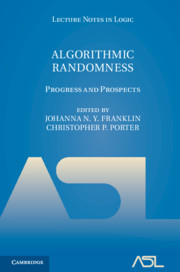Book contents
- Frontmatter
- Contents
- Preface
- 1 Key developments in algorithmic randomness
- 2 Algorithmic randomness in ergodic theory
- 3 Algorithmic randomness and constructive/computable measure theory
- 4 Algorithmic randomness and layerwise computability
- 5 Relativization in randomness
- 6 Aspects of Chaitin’s Omega
- 7 Biased algorithmic randomness
- 8 Higher randomness
- 9 Resource bounded randomness and its applications
- Index
2 - Algorithmic randomness in ergodic theory
Published online by Cambridge University Press: 07 May 2020
- Frontmatter
- Contents
- Preface
- 1 Key developments in algorithmic randomness
- 2 Algorithmic randomness in ergodic theory
- 3 Algorithmic randomness and constructive/computable measure theory
- 4 Algorithmic randomness and layerwise computability
- 5 Relativization in randomness
- 6 Aspects of Chaitin’s Omega
- 7 Biased algorithmic randomness
- 8 Higher randomness
- 9 Resource bounded randomness and its applications
- Index
Summary
Ergodic theory is concerned with dynamical systems -- collections of points together with a rule governing how the system changes over time. Much of the theory is concerned with the long term behavior of typical points-- how points behave over time, ignoring anomalous behavior from a small number of exceptional points. Computability theory has a family of precise notions of randomness: a point is "algorithmically random'' if no computable test can demonstrate that it is not random. These notions capture something essential about the informal notion of randomness: algorithmically random points are precisely the ones that have typical orbits in computable dynamical systems. For computable dynamical systems with or without assumptions of ergodicity, the measure 0 set of exceptional points for various theorems (such as Poincaré's Recurrence Theorem or the pointwise ergodic theorem) are precisely the Schnorr or Martin-Löf random points identified in algorithmic randomness.
Keywords
Information
- Type
- Chapter
- Information
- Algorithmic RandomnessProgress and Prospects, pp. 40 - 57Publisher: Cambridge University PressPrint publication year: 2020
Accessibility standard: Unknown
Why this information is here
This section outlines the accessibility features of this content - including support for screen readers, full keyboard navigation and high-contrast display options. This may not be relevant for you.Accessibility Information
- 2
- Cited by
